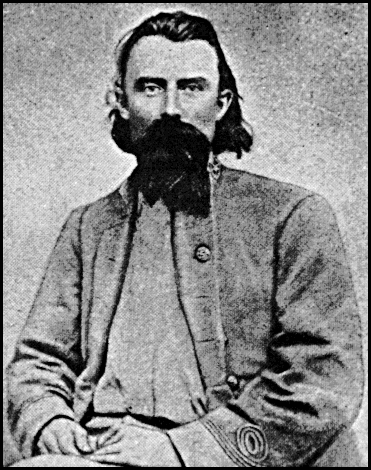| Joseph Orville Shelby |
| BACK |
 |
Joseph Orville Shelby was born on December 12, 1830 in Lexington, Kentucky. The Shelby family was one of Kentucky's wealthiest and influential families. J. O. Shelby attended Transylvania University and was engaged in rope manufacturing until 1852 when he moved to Waverly, Missouri. In Waverly, he engaged in various enterprises including steam-boating on the Missouri and a hemp plantation. Being successful, Shelby became a member of the Missouri's social and political elite.
Name SHELBY, Joseph Orville ōJoö Born December 12 1830, Lexington KY Died February 13 1897, Adrian MO Pre-War Profession Rope manufacturer, planter, Missouri-Kansas conflict. War Service 1861 Capt. of cavalry, Wilson's Creek, June 1862 Col., commanded a cavalry brigade, Prairie Grove, Helena (w), raided in Missouri 1863, December 1863 Brig. Gen., commanded a division in Price's Missouri raid, fled to Mexico to offer services to Maximilian. Post War Career Returned to US after the downfall of Maximilian, farmer, US marshal. General Jo Shelby led his "Iron Brigade" under this banner, and later used it after he ascended to Division command. In June 1865, he sunk his flag in the Rio Grande River on his way to Mexico rather than surrender the flag to the Federals. However, one of his men reputedly rescued the flag from its watery grave One of the Confederacy's most effective cavalry leaders, Joseph 0. Shelby served entirely in the Trans-Mississippi West. A planter and rope manufacturer, he had had investments in both his native Kentucky and Missouri. During the Bleeding Kansas episode he led a company of Kentuckians on the slavery side. Early in the Civil War he entered the Missouri State Guard and his assignments included: captain, Shelby's Ranger Company, Missouri State Guard (spring 1861); colonel, 5th Missouri Cavalry (1862); commanding brigade, Marmaduke's Cavalry Division, Ist Corps, Trans-Mississippi Department (summer December 1862); commanding brigade, Marmaduke's Cavalry Division, District of Arkansas, Trans-Mississippi Department January-July 4, 1863 and late 1863-September 1864); brigadier general, CSA (December 15, 1863); commanding division, Army of Missouri, Trans-Mississippi Department (September 18-September 1864); and commanding lst (Missouri) Cavalry Brigade, lst (Missouri) Cavalry Division, Cavalry Corps, Trans-Mississippi Department (September 1864-May 26, 1865). As a company commander he fought at Carthage, Wilson's Creek, and Pea Ridge before being sent back to Missouri to raise a regiment. As a colonel in charge of a brigade in John S. Marmaduke's mounted division, he fought at Prairie Grove and was wounded at Helena. Upon his recovery he was promoted to brigadier general and led a brigade at Jenkins' Ferry. During Price's invasion of Missouri in the late summer and fall of 1864 he led a cavalry division. When the Confederacy's collapse came he refused to surrender and led part of his force to Mexico where they unsuccessfully offered their services to either side. When General Robert E. Lee surrendered at Appomattox Court House, some Confederates refused to abandon their cause. Having heard that Lincoln liked the idea of having former Confederate soldiers oust Emperor Maximilian from Mexico, Shelby decided that he had found a way to save their honor, spread their lost Southern empire, and gain riches and glory all at the same time. Marching from camp at Corsicana, Texas, behind their war-scarred guidon or flag, the brigade passed through Waco, Houston, Austin, San Antonio, and other towns, declaring martial law and discouraging looters. In a funereal ceremony they buried their Confederate battle flag in the murky waters of the Rio Grande before heading into Mexico. But Shelby's men did not want to join Mexican guerrillas to fight the emperor's forces. Identifying themselves as "imperialists," the "Iron Brigade" headed for Mexico City to offer their services to Emperor Maximilian. Along the way they spilled the blood of guerrillas and bandits, and in the name of diehard chivalry, they carried out a fiery, bloody attack on a hacienda to rescue an imprisoned woman. Once in Mexico City, the "Iron Brigade" discovered its march to have been futile, and in a bittersweet final review, Shelby said good-bye. The fate of the brigade's guidon is unknown. He then returned to his business interests in Missouri. Shelby began growing wheat near Lexington, promoting railroads and operating coal mines. In 1893, Shelby was appointed U. S. Marshal by President Grover Cleveland and held that position until his death on February 13, 1897. |
